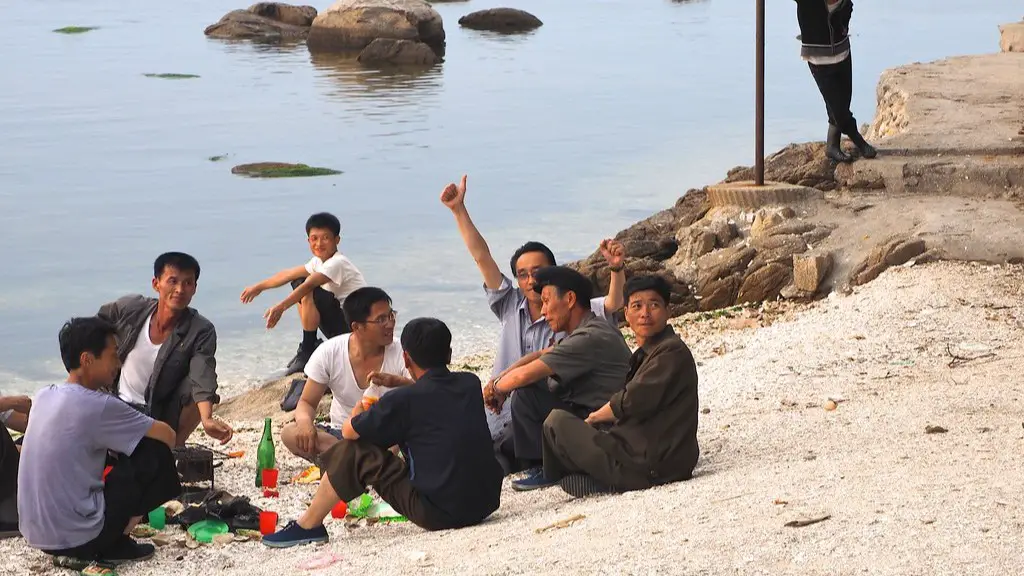Background Information
The United States has long held a hardline stance on North Korea, refusing to negotiate with the regime and often expressing sentiment for military action as a potential solution to the problem. This is despite North Korea’s nuclear arsenal and the potential catastrophic losses of life if any kind of military interaction were to occur. But why doesn’t the US attack North Korea?
Reasons for Not Attacking North Korea
Despite the obvious military might of the US, there are several key reasons why the US is unlikely to attack North Korea.
The first is North Korea’s arsenal of nuclear weapons. North Korea has developed a nuclear weapons program over the last several decades, producing both missiles and warheads capable of being launched and delivering devastating impacts. A US attack on North Korea would almost certainly mean the deployment of these weapons, leading to potentially massive civilian casualties in the region.
The second is North Korea’s ally, China. China has long provided financial and strategic support to the North Korean regime and has clearly spoken out against any sort of military action by the US. China has also warned that any kind of attack on North Korea could lead to open conflict between the two nations, something the US is keen to avoid.
The third is the relative lack of support from other nations. Despite North Korea being a key issue for the international community, there are very few voices calling for a US attack on North Korea. The US would likely face criticism from both allies and adversaries for any kind of military intervention and this would undermine the very legitimacy of any action taken.
Role and Impacts of Sanctions
The primary response of the US to North Korea has been the imposition of economic and financial sanctions. These sanctions have been aimed at punishing the North Korean regime and deterring further nuclear proliferation, while providing much-needed relief to the people of North Korea.
The sanctions have had a significant impact on North Korea’s economy and its ability to finance its weapons programs. They have also resulted in a decrease in the amount of foreign aid and investment the country receives, making it more difficult for the North Korean regime to support itself and its ambitions.
However, the impact of the sanctions is difficult to quantify as North Korea is an incredibly closed society and isolates itself from the outside world. Despite the sanctions, North Korea has managed to remain relatively stable and has been able to continue its weapons programs.
Implications of a US Attack
The implications of a US attack on North Korea are severe and would likely be far-reaching. Aside from the potential loss of life, a US attack on North Korea would almost certainly result in economic and political turmoil in the region. This could result in a refugee crisis, the destabilization of the region, and a deepening of tensions between the US and China, as well as other nations.
It could also lead to further nuclear proliferation, as other nations fear the US and could seek to develop nuclear weapons as a deterrent. The US would also put itself in the unique position of attacking a country with nuclear weapons, which could set a dangerous precedent for future use of such weapons.
US Policy and the Nuclear Non-Proliferation Treaty
The US has a long-standing policy of non-proliferation and actively seeks to prevent the spread of nuclear weapons. This policy is reflected in its membership of the Nuclear Non-Proliferation Treaty, which is designed to limit the spread of nuclear weapons and promote nuclear disarmament.
As part of this policy, the US has been reluctant to use military force against countries that possess nuclear weapons, as this could set a precedent and encourage other countries to develop their own nuclear arsenals in order to achieve the same protection.
This policy has been supported by numerous international organizations and is seen as essential to the maintenance of global security. This is why the US has refrained from attacking North Korea, despite the country’s clear violation of the Treaty.
US-North Korea Relations
The US has long viewed North Korea with suspicion, often viewing the country as a major security threat and enemy. But over the last several years, there have been signs of a thawing of relations between the two countries.
The US has pushed for a policy of a diplomatic solution and has not ruled out negotiations with North Korea, in spite of its nuclear armaments. This has led to a period of relative calm between the two countries and has resulted in a number of diplomatic breakthroughs, such as the summit between President Trump and North Korean leader Kim Jong Un in 2018.
The US has also sought to build ties with international partners, such as South Korea and Japan, in order to develop a united approach to the North Korean issue. This has allowed the US to have a more effective lever against North Korea, as it is now able to exert pressure from multiple angles.
Tensions in the Region
Despite the relative calm between the US and North Korea in recent years, tensions between the two countries remain high. North Korea has continued to conduct nuclear tests and expand its weapons programs, while the US has maintained its hardline stance on the issue and refused to back down.
This has led to a precarious situation, as the two sides could easily find themselves at the brink of conflict. The US has sought to use its military might as a deterrent to North Korean provocation, but the potential for catastrophic losses of life remains if hostilities break out.
Conclusion
In conclusion, attacking North Korea is considered too much of a risk by the US due to the country’s nuclear weapons program and its geopolitical alliance with China. The US has also been reluctant to attack North Korea due to its policy of non-proliferation and its support of the nuclear non-proliferation treaty.
Despite tensions remaining high between the US and North Korea, the US has engaged in various diplomatic efforts to avoid war and has sought to build bridges between itself and other nations in the region. Ultimately, the US does not want to risk all out war with North Korea and is instead looking for peaceful solutions to the standoff.


